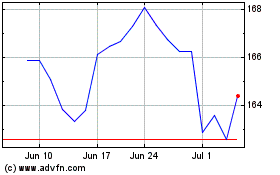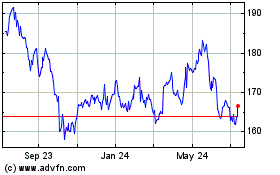By Allison Prang
PepsiCo Inc.'s new Chief Executive Ramon Laguarta said he has no
plans to break up the snacks and drinks giant, nor divest the
company's bottling operations, after completing a four-month review
of the global business.
"We believe our product and geographic portfolios make sense.
And we do not currently see the need to shed or acquire businesses
in any significant way," Mr. Laguarta said on a conference call
Friday after PepsiCo reported quarterly results.
Last year, PepsiCo agreed to buy seltzer-machine maker
SodaStream International Ltd., while rival Coca-Cola Co. bought the
Costa Coffee chain. PepsiCo has also faced questions from Wall
Street about whether it would keep its food business, which sells
Doritos, Sabra hummus and Quaker Oats, together with its drinks
business, which includes Gatorade, Aquafina and Mountain Dew.
The PepsiCo veteran, who took over as CEO in October, laid out
his plans Friday: ramp up investments in advertising, technology
and supply chains to boost growth and capture market share. The
company also started a new restructuring program that will shed an
undisclosed number of jobs and factories over several years.
The Purchase, N.Y., firm said Friday it expects to incur about
$2.5 billion in pretax restructuring charges through 2023, with
most of the charges coming from severance and other employee costs.
The company's 2018 results included $138 million of restructuring
costs, and it expects to incur $800 million in the current
year.
PepsiCo didn't elaborate on the extent of job cuts or plant
closures.
The maker of Mountain Dew, Quaker Oats oatmeal and Tropicana
orange juice also said it expects organic revenue -- which excludes
currency fluctuations, acquisitions and divestitures -- to rise 4%
this year, compared with 3.7% in the recently ended year. Core
earnings excluding currency fluctuations are expected to fall by
about 1%, driven by items including a higher tax rate and
investments being made this year.
In 2019, PepsiCo plans to make substantial investments in areas
such as adding manufacturing capacity and advertising and
marketing, Chief Financial Officer Hugh Johnston said on the
earnings call. The company is fresh off sponsoring the Super Bowl
LIII halftime show and airing commercials during the National
Football League championship game. The company has been working to
increase investments in Pepsi and Mountain Dew beverages to lift
sales in North America.
PepsiCo expects to spend about $4.5 billion on capital
expenditures in 2019, an increase of more than $1 billion from the
previous year. Mr. Laguarta said the company is "investing in brand
building, selling capacity and supply chain capacity."
The company will also be hiring more personnel to market and
deliver products to retail customers, Mr. Johnston told The Wall
Street Journal in an interview Friday. He didn't say how many.
Mr. Laguarta, who took over as CEO from Indra Nooyi, has been
working to focus the company on priorities including accelerating
organic revenue growth and managing costs, and using the resulting
savings to reinvest in the business. To push sales growth, PepsiCo
has looked at increasing advertising, broadening product lines and
making changes to packaging.
"There is further growth and further opportunities for us to
grow share" in PepsiCo's categories, the CEO told analysts on the
call. "And the process started with, let's see how we can refocus
the discretionary funds that we have in each one of our
business[es] against the growth opportunities."
When asked by an analyst about potentially separating the
company's snacks and drinks business, Mr. Laguarta underscored the
benefits of keeping the operations together. He said the company is
able to show its strength, like around the Super Bowl, when it is
able to create displays with products from each category.
Mr. Laguarta also told analysts the company can compete without
selling off or refranchising its North American bottling and
distribution operations, a move that Coca-Cola completed in 2017.
He said the North American drinks business "will play a very
important role in the future of PepsiCo, and we're convinced it
will drive very good results for us."
The company will be integrating its bottling business into its
five new regional divisions under its North America beverages
business, the company told employees Friday. Trade publication
Beverage-Digest earlier reported the bottling changes.
Shares of PepsiCo rose 3% to $115.91 in Friday trading after the
company forecast higher growth for this year. It said
fourth-quarter revenue was flat from a year earlier though it
benefited from higher prices in its North America units. Because of
higher transportation costs, the beverage maker had planned to
raise prices on some of its Frito-Lay products in October.
Earlier this week, Coca-Cola Co. said it expects sales to slow
in 2019. In the latest quarter, Coca-Cola said tea and coffee sales
volume rose while soda sales volume fell. Shares in the company
fell 8.4% to $45.59 on Thursday.
PepsiCo said revenue was $19.52 billion in the fourth quarter,
in line with estimates from analysts polled by Refinitiv. Organic
revenue rose 4.6%.
Among PepsiCo segments, Frito-Lay North America saw the biggest
increase in the quarter, with revenue climbing 3.6%. Revenue rose
1.8% in the company's North American beverages division.
PepsiCo reported a fourth-quarter profit of $6.85 billion, or
$4.83 a share, which included a $4.93 billion income-tax benefit.
For the comparable quarter a year prior, the company posted a loss
of $710 million, or 50 cents a share.
Excluding one-time items, earnings were $1.49 a share, which met
analysts' estimates.
Write to Allison Prang at allison.prang@wsj.com
(END) Dow Jones Newswires
February 15, 2019 18:13 ET (23:13 GMT)
Copyright (c) 2019 Dow Jones & Company, Inc.
PepsiCo (NASDAQ:PEP)
Historical Stock Chart
From Mar 2024 to Apr 2024

PepsiCo (NASDAQ:PEP)
Historical Stock Chart
From Apr 2023 to Apr 2024
